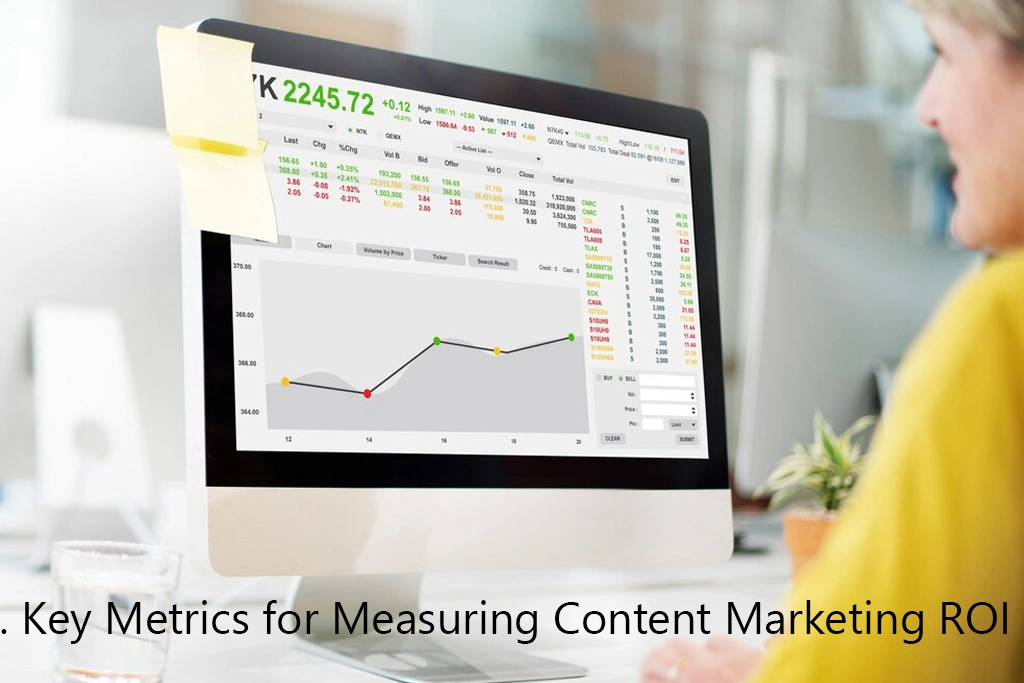Table of Contents
ToggleIn today’s digital marketing landscape, measuring the return on investment (ROI) of content marketing efforts is essential for businesses looking to optimize their strategies and achieve meaningful outcomes. Understanding which metrics to track and utilizing the right tools can provide valuable insights into the effectiveness of your content marketing campaigns. Here’s a comprehensive guide to help you navigate and measure the ROI of your content marketing efforts.

1. Key Metrics for Measuring Content Marketing ROI
Traffic Metrics
Measuring the number of visits is very important in the analysis of content performance. Talking about the visits, unique visitors, and page views shows how many people are actually reading your content. Analysis of the traffic sources like organic search, social or referral sources enables one to determine the most efficient forms that are attracting the audience to the site.
Engagement Metrics
The engagement metrics relate to how users respond to your content, comments, shares, and more. Engagement level is benchmarked using average time on page, bounce rate – which is the percentage of Unique IPs who came to the site only to go to one page at the site – and pages per session. Moreover, likes, shares, and comments also indicate the degree of users’ activity and the relevance of the shared materials.
Conversion Metrics
Lastly, conversion is the best measure that defines how useful your content marketing strategies are. This tracks the relatable important conversion metrics such as leads, sales, and other business objectives such as email sign-ups or form submissions that put into perspective how effective the content is in making the audience take the desired action.
2. Tools for Tracking Content Marketing Performance
Google Analytics
Google Analytics offers high-quality information on content in detail. Key reports include the traffic sources, the behavior of the users, and the conversion. Goals needed to be set up so that particular actions by the users can be monitored on a website, for example several times an icon of a shop, an ordering of a product, or a subscription for a voucher.
Social Media Analytics Tools
Thus, facilities such as Facebook Insights, Twitter Analytics, and LinkedIn Analytics can provide precise statistical data on the performance of posts, demographics of the targeted audience, and engagement rates. Such an approach allows for improving content that is posted to social networks and analyzing the effectiveness of this communication channel.
CRM Systems
This way, merging content marketing KPIs with Customer Relationship Management (CRM) allows seeing the big picture of client engagements and sales. With the help of CRM data, revenues generated by particular content campaigns are identified, which is useful in calculating the campaign’s return on investment and fine-tuning future marketing activities.
3. Calculating Content Marketing ROI
Cost Analysis
Determine the total expense which is involved in the generation and dissemination of content and promotions. This should cover any cost linked to the creation of the content as well as paid advertising and the cost of hiring an agency, among others. Cost analysis aids in defining the general expenditure when participating in content marketing strategies.
Revenue Attribution
Such models as first touch, last touch, or multi-touch help define the content’s contribution to the overall revenue. With the help of such analytics, businesses will understand which content assets provide the highest results in terms of conversions and, thus, sales.
ROI Formulas
The ROI formula defines the gain from content marketing initiatives by putting a figure to investment. The application of this formula to your various campaigns gives the precise ROI percentage that offers an appreciation of the profitability and efficiency of your content endeavors.
Content Optimization
SEO and usability improve customer visibility and interaction since they produce content that is relevant to search engines and people. Strategies like keyword research, on-page SEO (meta tags, interlinking), and enhancing readability guarantee that the content is relevant to your audiences.
AdsRole: Your Partner in Effective Content Marketing
Unlock the potential of your digital presence with AdsRole, where we specialize in comprehensive content marketing solutions tailored to elevate your business. From strategic content planning and creation to precise audience targeting and ROI-driven analytics, AdsRole ensures every campaign resonates with your audience and drives tangible results. With our expert team and cutting-edge tools like Google Analytics and CRM integration, we deliver measurable outcomes that align with your business goals. Trust our content marketing services agency to optimize your content strategy and maximize ROI, guiding your brand toward sustained growth in the competitive digital landscape.










